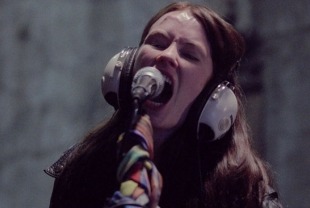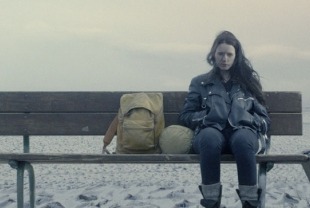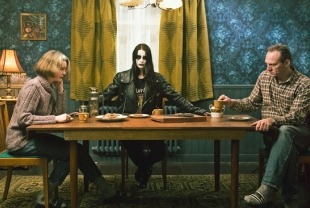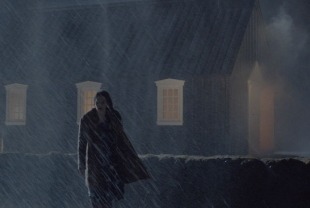Karl (Ingvar Egggert Sigurosson) and Droplaug (Halldora Geirharosdottir) live on a small dairy farm in Iceland. When their teenage son Baldur is critically injured in a tractor accident, their 12-year-old daughter Hera is the first to see his mangled body. On the way to the hospital, Droplaug is deeply traumatized as she clutches Baldur's dead body to her chest. Karl does not know how to deal with his emotions and secretly blames himself for not taking better care of the old tractor.
Twelve years later, the family still has not come to terms with the trauma of Baldur's death; their grief is palpable. Droplaug has kept his room just as it was and is troubled by nightmares and the need to wash his blood off her hands. She and Karl are not getting along with each other and haven't shared their feelings of loss, anger, and despair.
Hera (Thora Bjorg Helga), who was extremely close to her older brother, has taken up his obsession with heavy metal rock music. She has learned how to play his electric guitar and yearns to escape from the confines of the dreary farm. But each time she packs her things and goes to take the bus to the city, she loses her courage and returns home.
Hera is viewed as the enfant terrible in the small village, and her parents grow increasingly embarrassed by her bizarre behavior. She wears a black leather jacket, drinks too much liquor, and occasionally races a neighbor's tractor down the highway at night. Often she wakes up in a drunken stupor and lays around all day looking at magazines about metal culture.
What she does care about, passionately, is her music, which she plays as loud as she can, irritating her parents and unnerving the cows when she plays in the barn. She is writing her own songs, for which she screams the lyrics. At one point she drives a herd of sheep away with her blaring music; another time she plays a tape of heavy metal music through the sound system of the slaughterhouse where she works, creating pandemonium in the place. She creates more chaos when she dances wildly during a night out at the grange hall.
Her only friend is a heavy set and socially awkward young man she known since childhood. He's lonely too, and she responds by having sex with him. Surprising her parents one day, she joins them by going to church. But when the new priest asks her to put out her cigarette, she leaves.
The priest, however, does not give up on her, especially after learning of the family's trauma and continued grief. He visits and tells Hera that he has always been a big fan of heavy metal rock music. He shows her a tattoo on his shoulder. It turns out they love the same bands and songs. Feeling she has found a kindred spirit, Hera goes to his place, but after she kisses him, he turns her out. Once again in a dark and lonely place, she sets the church on fire.
Metalhead is a deeply spiritual film with its intense portrait of the pain of grief, the loneliness of choosing a path of rebel and outsider, and the long hard road to creativity as a disciplined musician. After drenching us with scene after scene of the suffering that comes with the sudden and inexplicable death of a child, writer and director Ragnar Bragason brings on a series of events that are signs of God's grace given to Hera and her parents. We won't tell you what they are in order that you may savor their cumulative impact on your heart, mind, body, and soul.
This is the kind of character-driven and dramatically authentic indie film that shakes us up with wonder and awe, two spiritual qualities we all yearn for that have the capacity to lift us out of even the darkest moods.
Go Deeper
When Janus, the new priest, comes to counsel Hera about her grief, she tells him from the start that he will never understand her. She also makes it clear that he probably is incapable of appreciating heavy metal music: "You don't understand. The Church has always belittled these bands. You say they all worship Satan and such. But if you'd listen to the lyrics, they're about reality. Death is real. War is real. It tells things like they really are without any sugar-coating. You could never understand."
Janus responds, "God can also be found in the dark. Jesus wasn't afraid of sitting with the outcasts. He was an outsider himself. That's the reason they nailed him to the cross. Most people just couldn't handle what he was saying. 'Take people as they are.' "
Metalhead not only blasts a hole in our conventional attitudes toward heavy metal rockers, it gives us a brief but rounded encounter with a priest who is familiar with popular culture and open to its cathartic value for many youth. Equally startling is the response of the members of the church to Hera and her music after the fire.
Ragnar Bragason proves to be a master of the spiritual practice of openness. "All real living is meeting," scholar Martin Buber said. This is the heart of our humanity — being here, open, and empathetic to others. There is so much that is lost and when we close off to those we do not understand or accept. Let Metalhead open your heart.



